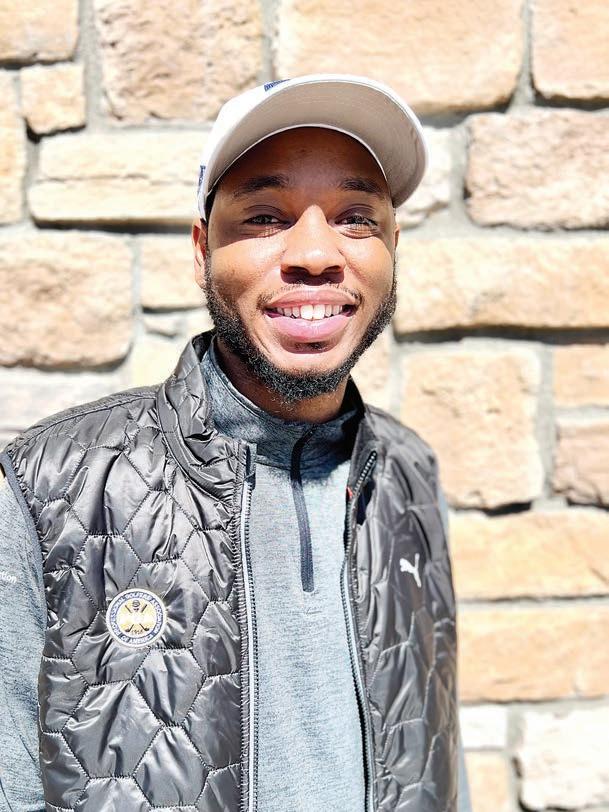
2 minute read
Leaving basketball for golf in Larkspur program
Davyon Collins joins Colorado PGA
BY ALEX K.W. SCHULTZ SPECIAL TO COLORADO COMMUNITY MEDIA
After playing basketball since he was hardly bigger than a basketball, playing and coaching hoops at the collegiate level, and working for an NBA team’s minor league squad, Davyon Collins is taking his knowledge and skills to … e golf course?

Yes, the golf course. It actually makes perfect sense once you’ve gotten to know who Collins is and what the 26-year-old stands for.
Last year, the Houston native packed his bags and headed north to begin working as the second-ever PGA WORKS Fellow for the Colorado PGA Section, which is based in Larkspur.
Funded by the PGA of America’s charitable arm, PGA WORKS is a strategic initiative designed to diversify the golf industry’s workforce. e fellowship program o ers a one-year, paid immersion in the Colorado PGA Section, giving fellows a taste of what a career in the golf industry can provide.

Collins said the game of basketball opened many doors for him. He earned a bachelor’s degree from Dallas Christian College, where he played point guard and was a four-year Academic All-American and voted team captain his senior season. He received a master’s degree from Dallas Baptist University, where he spent two seasons as a graduate assistant. After graduating from DBU, he spent a year on the Southwestern Assemblies of God men’s basketball coaching sta . His education and knowledge of the game helped him land a community development and gameday operations gig with the Texas Legends, who are the Dallas Mavericks’ NBA G League a liate.
Now, the basketball lifer is turning his attention to the world of 9-irons and birdies and fairways, hoping to use the game of golf to open doors for others, including and perhaps especially those who didn’t know those doors existed in the rst place.
“ e game of golf is kind of tucked away,” Collins said. “People know about it because it’s in front of their faces, but I’ll ask someone the question, ‘Have you seen a course? ere’s a course two minutes away that you pass by every day that you don’t know anything about.’”
Collins said people will drive by the same golf course time and again without ever thinking about stopping for any number of reasons: they fear they’ll be judged for their golf skills, or lack thereof; they don’t even know where to begin (“Should I get a cart rst?” “Where do I even get a cart?” “Where’s the driving range?” “Does this course have a dress code?”); or, worse yet, they may feel like they don’t “belong” based on their sex or the color of their skin.
Hop online and you’ll see what Collins is getting at. A Google search for “PGA Tour player demographics” yields results like “Golf’s Lack of Color” and “Diversity Remains Golf’s Biggest Challenge.”
According to a Golf Diversity & Inclusion Report published a few years ago, the makeup of American golfers at all levels is 77% male and 80% white. Among golfers in the professional ranks, 75% are male and 86% are white. And golf-industry workers — everyone from caddies to greenskeepers — are 90% male and 88% white.

“Out of all the sports, other than hockey, I would say golf has the most room for growth when it comes to diversity and inclusion,” Collins, an African American, said. “ e game is, to be totally honest, an older, male game. It’s mostly 45-andolder men who play it.

“I feel like within the game of golf, you don’t need the money. e money (to enhance the game’s diversity and inclusion e orts) is there. You just need people who care about other people.”










